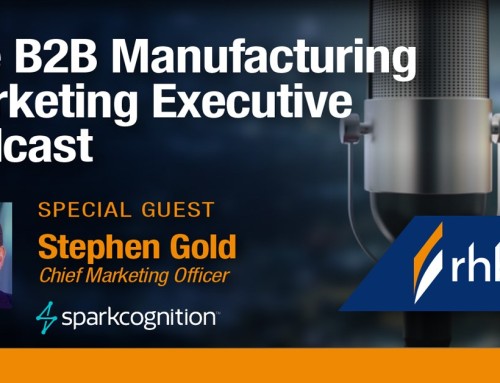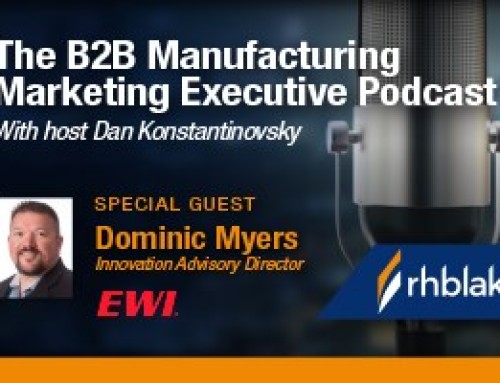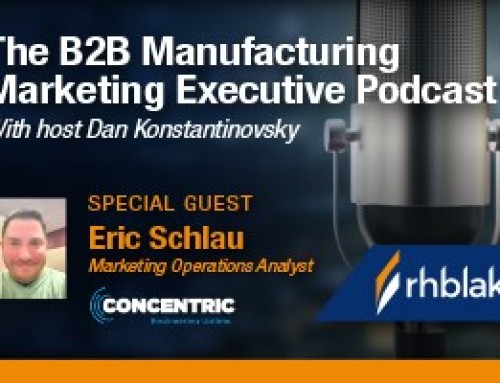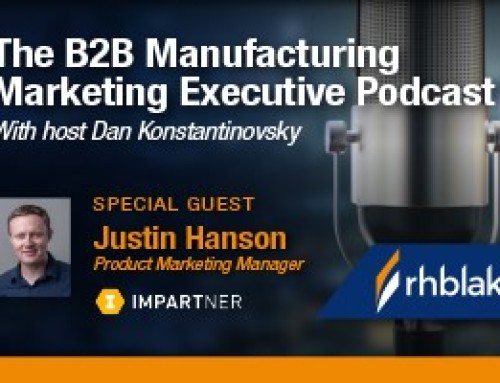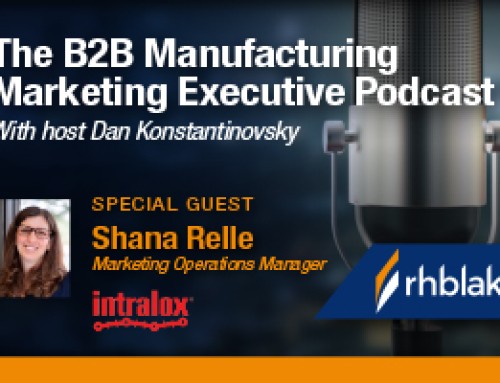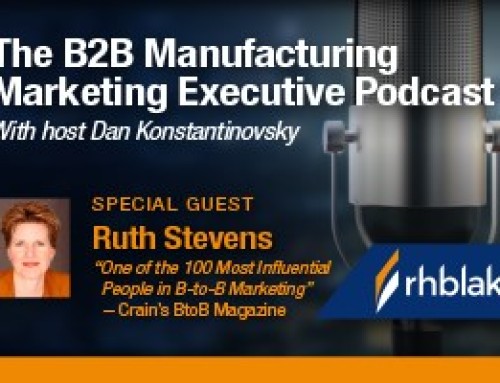Interview with Beth Coleman
Welcome to the B2B Manufacturing Marketing Executive Podcast.
If you want to learn how leading B2B Marketers are achieving excellent growth results, you are in the right place. This episode is brought to you by R. H. Blake a leading B2B and manufacturing focused marketing agency. To learn more, visit rhblake.com. Now here is your host Dan Konstantinovsky.
Connect with Beth Coleman, Email Marketing Manager, Big Ass Fans
Thank you, Dan. It’s great to be here.
Yeah. Great. I can say that I am a Kentucky native. That’s going to be important in just a second. I was born and raised in Rockcastle County, Kentucky, sort of Southeastern Kentucky. Big Ass Fans is a brand that I’ve known through its entire existence because the company started in 1999. So Big Ass Fans, when I was in high school, was this really provocative brand that you were driving in downtown Lexington… Lexington for me was the big city, right? This is before I traveled, before I worked in any other metropolitan area, and they had a huge billboard downtown, that was a picture of a donkey. It was zoomed in on the rear end of the donkey, and it said Big Ass Fans.
At the time, I had always thought about going into advertising and as a kid, driving by this billboard, it was funny. It makes you chuckle. We laugh at ourselves all the time and that’s one of the reasons I love working here, but Big Ass Fans actually produces exactly what it says, big ass fans. We’re the industry leader in HDLS fans. That’s high volume, low speed. So the most innovative, the best quality engineered fans in the space that you can get, that these are some of the safest ways to produce high volume, energy efficient airflow in your space. So we are definitely in the business of making people safer, healthier, more comfortable at work, and I got to tell you in July, it’s nice to work at a place with a lot of fans.
It’s interesting in the industrial space, you used the word provocative, rarely do you see provocative names of brands or maybe of companies. How do you think that’s impacted you as a company and maybe as a marketer?
Well, I alluded a little bit to how it affected me as marketer, but I’ll tell you as a company, it definitely hasn’t hurt us because people know what they need in the industrial space, to a large extent. They understand, I would say, the core issue. The core issue is “I’m hot.” Or heat stress is a problem in my space. What can I do about that immediate issue?
One of the first things that people think about is fans. So a company like Big Ass Fans is [inaudible 00:03:10] brand a lot easier to find. So that’s one reason why, Dan, we were talking a little bit before we got on the call, that you had seen the booth at trade shows, right? That’s an excellent channel that the company has been able to leverage, and that Big Ass brand is one of those things that really stands out to people. We appreciate the humor in it. We embrace it. We don’t make too many ass jokes on a regular basis, I can promise you that. But we’re very serious about the product and in love with what we do.
No, no, no. Extremely interesting. Then this is, I think, where you’re headed with many of those points, is it’s around analyzing the data?
Mm-hmm.
And maybe seeing kind of what’s working and what’s not. Could you talk a little bit about that? How are you maybe leveraging the data? What is your perspective there? Then also, how does maybe the quality of the data impact your decisions?
I would definitely say that data hygiene matters a lot and data analysis matters a lot. That might mean that you have high level dashboards that just let you know how campaigns are performing. A lot of marketers reduce to that, but I’ll tell you, especially in BB space and having worked, not just in industrial space, but across other sectors, I can say that it’s a problem that people who come from a sales culture tend to accumulate a lot of data. Right? You’re trying to get as many leads as possible, but how a business looks at that over the long term, that’s really a relationship between your marketing team and your CRM team, and really kind of understanding and saying, “Okay, hey.” Me as the email marketer, for example, I don’t necessarily want to send out a ton of promotional emails to folks that we were reaching out to 15 years ago. Right?
Part of that is also that algorithm piece that I talked about, because on average, your database turns over about 20% per year. So imagine if you’re not going back through and cleaning up that data, or you’re not keeping those promotional lists really tight to who you think those conversions and those genuine prospects are, then that means you’re going to ruin your email reputation as well. That means that you’re going to see some negative impacts from that over time.
A lot of people just don’t think about that because that’s just in the industrial space and in the B2B space, just not the way they’re trained to think, because we’re just trained to think, “Hey, let’s go out and get leads” and that’s not wrong. That’s still very important, but you have to look at the ecosystem that those leads are being dropped into and you really have to understand what’s the intention when somebody’s coming to me and establishing a relationship with my brand, and particularly through the email channel, what am I going to do long term to make sure that we’re not garbage in, garbage out, as it were?
Beth Coleman
Email Marketing Manager
Big Ass Fans
Yeah. I’m really glad that you asked that question, Dan, because it’s not just about channel ownership, right? It is, as you allude to, it’s integrated marketing. That’s what needs to be happening with any campaign and very particularly a product launch, because working in the industrial space and especially in this era where there’s so many supply chain constraints and different factors that go into a product launch, that can be kind of volatile, there needs to be really tight and consistent communication with the product owner on your side, with the sales team, with the marketing team, with the executives team, kind of on what exactly is going to happen and when. It’s going to have to be dynamic, it’s going to have to be flexible. So for me, for example, how that affects email, is I tend not to schedule a lot of emails in advance, even though I have that ability. Especially when it comes to a product launch, it’s often me at my computer and I’m waiting until a very specific moment that I’m going to hit send, and I’m going to hit send to specific groups at specific times.
So it’s very coordinated. That for product launch is months and months in advance. I mean, it’s years for the actual product, right? People just don’t know until [inaudible 00:12:51] in it. But when we were launching the most recent, Powerfoil FX4 fan, the latest generation of our truly big fans in the spring, it was very much that, “Hey, we’ve got something that we’re very excited about. What are we going to tell people?” in those early conversations. What’s most exciting about this product? What is going to be the best feature for our end customers and those specific different customer groups? Who do we not necessarily want to push this to? We want them to know that this is here, but maybe this is the solution for every single one of our customers.
So really having that judicious conversation of, yes, we have this wonderful product. Yes, we know that it is hugely relevant and makes an impact. What exactly for me does that mean in terms of building out those contact lists and advance testing, perhaps, other content in advance to see sort of how that performs? What different types of messaging might need to go out and get integrated into that?
Then also working with our creative team. We’re spoiled for riches in terms of Big Ass Fans. Let me tell you, I am constantly impressed by our creative services team, our copy team, everybody in digital marketing. It’s really an amazing team to work with. So just having all that together in sort of a documentation format, in table format, in whatever your product management workflows are, that you go through your different services, your base camp, right? [Trello 00:14:24], whatever service platform you use, and keeping it in a tight and consistent thread. So, understanding who within the company you really need to be talking to? Pressing them on the questions, not just from their perspective, because everybody in the company loves it, right? But from the end user and that customer perspective. Hopefully that answers your question.
Absolutely. Maybe just an additional question around that point, any best practices that you could point to, as you’ve implemented many email campaigns? I guess I’m thinking about best practices from the perspective of maybe how you structure or the cadence? But also kind of what you were just referring to, is maybe the internal process? Anything that you could point to that you say, you guys have gotten better or kind of over time, and that maybe you could share with others..
Yeah. I mean, I think that coming together as a marketing team and really saying what’s our concept, and being given the space and the freedom to sort of look at and execute those concepts, is kind of important. Now of course, we’re beholden to what those structural goals are of that product launch and that campaign. Those are crucial, but we’re a fun brand, and we try to have fun as much as possible, while also adhering to just a few short words in an email or a tweet, for what are we trying to say to who. Getting that down together and being on the same page together really is a huge benefit, because often you’ll get teams that are positioned as a fulfillment agency, right? Once you get shifted to a fulfillment model, as a marketer, things start to get a lot more problematic.
You might have somebody who’s very sold on what that vision and message is. That might be the perfect vision and message. But then once you’ve shifted, you’ve sort of taken the creativity out of it for folks at that point. Right? You’ve got a very clear vision of exactly what needs to happen, and once the focus is on just executing the pieces and not stepping back to look at how they fit together, how your other campaigns, your other segments are affected, that’s where you get into trouble. I guess I’m biased because I’m a marketer, right? Marketing team [inaudible 00:16:50] a little more freedom. But I don’t want to say that, but really being able to have that comfort zone together and to be on the same page together is really encouraging. It’s the most motivating thing about the day.
Thank you. I’m honored to be here today and honored to work for a company that inspired me to go on to marketing.



